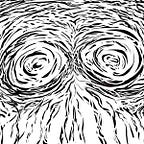Why to Make Money
It’s an unusual question — the answers seem obvious: to eat, to pay rent, keep the power on; In short, we make money to live. Some people, however, gamble away money, or spend that money on something that makes life more pleasant instead of something that keeps them alive longer, even when that’s all the money they have. Some people have enough money to live for generations, and yet continue devoting their time to making more; We make money in order to eat, pay rent, and otherwise effect our situation, but we don’t make money specifically to live. Life is just a product some of us subscribe to.
So who are we paying for our subscription to life? No human has a greater command over life than another — and none outside of a cult would claim to — but still most of us fear for our lives should we run out of money with no way to get more. Currency has been a part of society for so long we’ve begun to think of it as having an inherent value. What does that mean: food contains nutrients, and on consumption those nutrients are redistributed amid the body of the consumer. How much the consumer likes the food, or how full they are, does not effect the food itself, and so the nutrient value is inherent. The nutrient value is tied directly to what the food is.
The currency value of that food is a different matter entirely: the price of food is effected by everything outside of the food itself, including how much other food is around it, or even an individual’s opinion of that specific piece of food. The currency value is applied to the food from outside itself, and therefore isn’t a trait of the food but rather something arbitrary applied by us.
Whether or not this makes sense to you, it’s fair to say that most of us aren’t thinking about it every time we buy groceries. Try to put yourself in the mind of a farmer millennia ago, back when currency was as common as barter. You live a day’s travel away from the city and its market, and that travel requires food. If you want to barter, you must take whatever goods you have to the city, and since you are actively living off those goods you are indeed actively thinking about how well they can sustain you. On the other hand, merchants from the city will occasionally visit your farm and offer currency in exchange for your food. In the case of bartering at the market, it’s entirely plausible to trade all of your goods for something else you can live off of. In the case of the merchant, however, trading all your goods for any amount of currency is dangerous — you can’t eat currency, nor can you plant it, or even build with it.
Back to the modern era, currency has become synonymous with whatever it’s spent on, all the way down to human life. As scarcity becomes more prevalent, more and more of us are thinking about the inherent value of currency. Some of us start personally devaluing currency, others try inventing their own currencies through crypto and NFTs. Whether we think the answer is to move away from it, or make our own, we’re all slowly coming to the same conclusion: money is made up.
So why make money? It offers some benefits in terms of convenience, but it also obfuscates what we as a species have control over and what we don’t. Regardless, the fact of the matter is our human society is built around it. Make money because you have to, make money on accident, but the only reason to set your goal explicitly to “making money" is to carry on as normal. Are we doing well enough to keep going as we have been?
